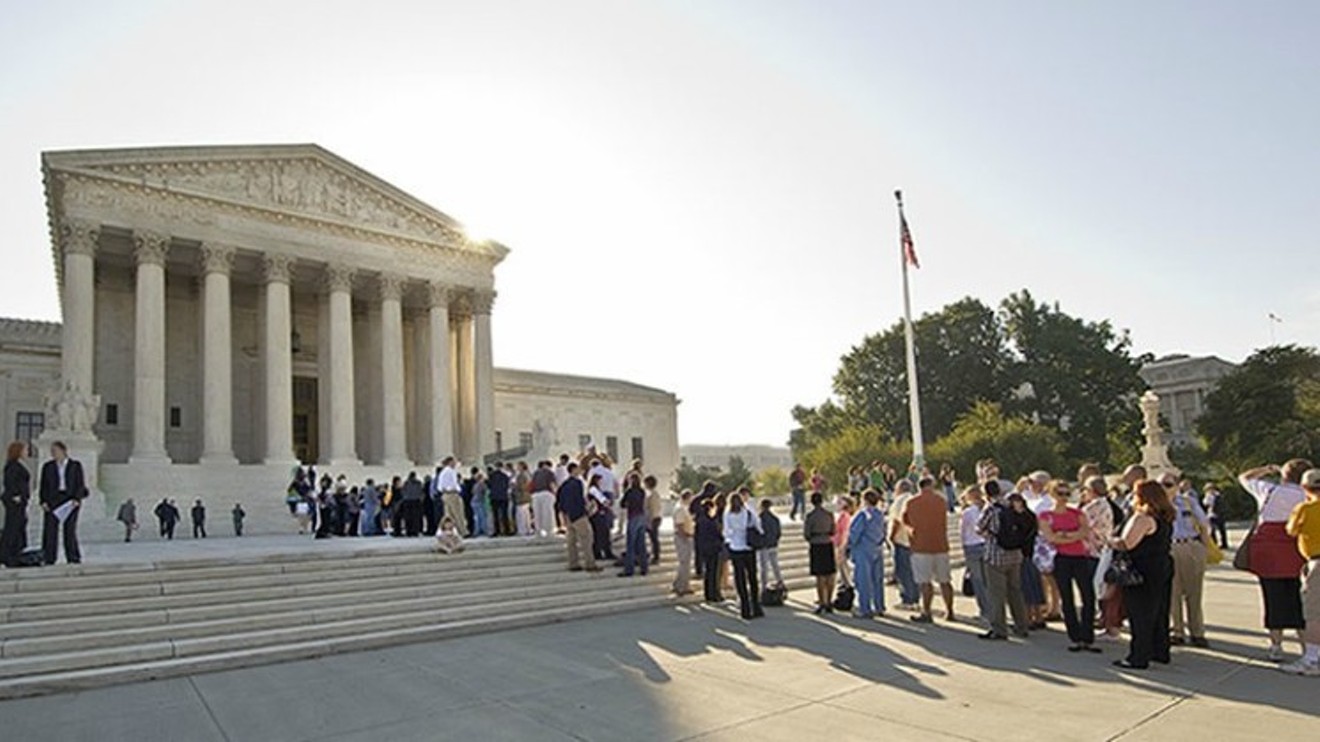On March 20, the court delivered his worst-case scenario. The often-divided justices ruled 9-0 against the matter formally known as Obduskey v. McCarthy & Holthus LLP.
For Obduskey, the decision definitely stings. "I feel badly that it's made interpretation of the law for half of the country worse," he says, adding that "to me, this heightened the awareness. I’m committed to making the changes happen in Colorado while pushing on the national level, but knowing improvements won’t happen until we have a new U.S. president and senate."
Obduskey is a significant player in the Colorado Democratic Party. A past state senate candidate, he's the co-chair of the Colorado Dems' platform committee and represented Vermont Senator Bernie Sanders on the party's national platform committee in 2016, when the group's embrace of his proposal for a federal pathway to marijuana legalization made national headlines. Among those who weighed in on his side in the U.S. Supreme Court case was another 2020 presidential candidate, Massachusetts Senator Elizabeth Warren. Yet the controversy stemmed from problems closer to home — the one he purchased in Bailey circa 1998.
Nine years later, Obduskey says, he refinanced his mortgage with the help of two firms headed for doom: First Magnus, which filed for bankruptcy later that year, and Superior Mortgage, a local company that would get in trouble by decade's end. In 2009, a Denver grand jury returned a nine-count indictment against the firm's Kedrick McDuffie for allegedly engaging in a scam that cost borrowers, investors and financial institutions thousands of dollars.

Senator and presidential candidate Elizabeth Warren was among the politicians who weighed in on behalf of Dennis Obduskey, right.
Courtesy of Dennis Obduskey
Filing for foreclosure in Colorado doesn't require a lawsuit. The state uses a process called non-judicial foreclosure, and in trying to navigate the system, Obduskey ran into obstacle after obstacle. Between 2009 and 2012, three different foreclosure actions were started against him, only to be withdrawn later.
Finally, in 2015, Obduskey filed a federal lawsuit against Wells Fargo and McCarthy & Holdus, the law firm behind a fourth foreclosure in 2014. The complaint focused mainly on the Fair Debt Collection Practices Act (FDCPA), whose stated purpose is "to eliminate abusive debt collection practices by debt collectors, to insure that those debt collectors who refrain from using abusive debt collection practices are not competitively disadvantaged, and to promote consistent State action to protect consumers against debt collection abuses."
Arguments against the current practice in Colorado were rejected in that case and a subsequent appeal for reasons that left Obduskey slack-jawed: "The Tenth Circuit, which is the appellate court that ruled against me, basically said, 'The FDCPA doesn't apply because foreclosures don't have anything to do with money.'" However, this determination attracted the attention of Daniel Geyser, an attorney with Dallas-based Geyser P.C., who saw the case as a perfect vehicle for a U.S. Supreme Court challenge of the non-judicial foreclosure rules in Colorado and 32 other states.
The Supremes weren't persuaded. Justice Stephen Breyer, who penned the unanimous decision, called the claims "unconvincing," adding, "Obduskey fears that this Court’s decision will permit creditors and their agents to engage in a host of abusive practices forbidden by the Act. But the Court must enforce the statute that Congress enacted, and Congress is free expand the FDCPA’s reach if it wishes."
Justice Sonia Sotomayor echoed this last suggestion in a concurring opinion. "This is a close case," she wrote, "and today’s opinion does not prevent Congress from clarifying this statute if we have gotten it wrong."
This sentence sums up the scenario well, in Obduskey's view: "It's clear we need a legislative fix, and I think Justice Sotomayor has been very helpful in that sense."
The problem is, such legislation at the federal level would have no chance of success right now, as Obduskey acknowledges. "We'll need to change the national laws once we get a Democratic Senate and president. It's not going to happen overnight," he says.
Alterations can also be made on a state-by-state basis, and with Democrats holding a majority in both legislative chambers in Colorado and party member Jared Polis occupying the governor's mansion, odds of changes here are better. Still, Obduskey thinks that any such proposal would likely wait until the 2020 session, since the 2019 edition is already so far along.
On a more personal front, Obduskey is trying to avoid losing both his Bailey home and the one in Pueblo where he subsequently relocated. Using his Democratic party connections, he says he's had conversations with Colorado Attorney General Phil Weiser about whether something can be done based on his belief that Wells Fargo filed a false proof of claim — a bankruptcy form on which creditors record debt amounts at the time of a bankruptcy filing.
When Obduskey first heard about the U.S. Supreme Court decision yesterday, two words popped into his head: "Oh shit."
But since then, he's had some time to reflect. "I'm trying to keep a positive attitude," he says. "This isn't the end. It's a speed bump — a big speed bump, but still a speed bump. And just because it's big doesn't mean the car will never get over it. It's a setback for consumers that can be fixed."













